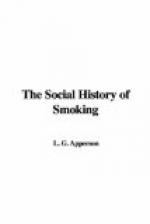LAMB, A Farewell to Tobacco.
The social attitude towards smoking in early Victorian days, and for some time later, was curious. The development of cigar-smoking among those classes from which tobacco had long been practically banished, and the natural consequent spread downwards of the use of cigars—in accordance with the invariable law of fashion—together with the continued devotion to the pipe among those whose love of tobacco had never slackened, made smoking a much more general practice than it had been for some generations.
It is somewhat significant that Dickens, in the “Old Curiosity Shop,” 1840, makes that repulsive dwarf, Quilp, smoke cigars. When the little monster comes home unexpectedly in the fourth chapter of the book, and breaks up his wife’s tea-party, he settles himself in an arm-chair—“with his large head and face squeezed up against the back, and his little legs planted on the table”—with a case-bottle of rum, cold water, and a box of cigars before him. “Now, Mrs. Quilp,” he says, “I feel in a smoking humour, and shall probably blaze away all night. But sit where you are, if you please, in case I want you.” Quilp smokes cigars one after the other, his wretched wife sitting patiently by, from sunset till some time after daybreak. The dwarf’s tastes, however, were catholic. A little later in the book the reader finds him, when encamped in the back parlour of the old man’s shop, smoking pipe after pipe, and compelling that knavish attorney, Sampson Brass, to do the same. Tobacco-smoke always caused Brass “great internal discomposure and annoyance”; but this made no difference to Quilp, who insisted on his “friend” continuing to smoke, while he inquired: “Is it good, Brass, is it nice, is it fragrant, do you feel like the Grand Turk?” But Quilp and Brass were not in “society.”
Notwithstanding that the number of smokers had so largely increased, and was continually increasing, smoking was regarded socially as something of a vice—to be practised in inconvenient places and not too publicly.
There were still plenty of active opponents and denouncers of tobacco. One of the most distinguished was the great Duke of Wellington, who abominated smoking, and was annoyed by the increase of cigar-smoking among officers of the army. In the early ’forties he issued a General Order (No. 577) which contained a paragraph that would have delighted the heart of King James I. It ran thus: “The Commander-in-Chief has been informed, that the practice of smoking, by the use of pipes, cigars, or cheroots, has become prevalent among the Officers of the Army, which is not only in itself a species of intoxication occasioned by the fumes of tobacco, but, undoubtedly, occasions drinking and tippling by those who acquire the habit; and he intreats the Officers commanding Regiments to prevent smoking in the Mess Rooms of their several Regiments, and in the adjoining apartments, and to discourage the practice among the Officers of Junior Rank in their Regiments.”




